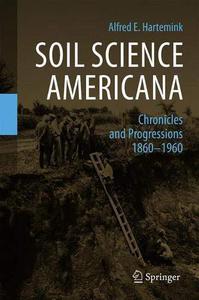
Soil Science Americana: Chronicles and Progressions 1860─1960 by Alfred E. Hartemink
English | EPUB | 2021 | 642 Pages | ISBN : 303071134X | 159.9 MB
This book narrates how the study of the soil became a science and institutionalized in the USA between 1860 and 1960. The story meanders through the activities, ideas, publications, and correspondence of people who influenced the progressions, that led to the budding and early blossoming of American and international soil science. Interwoven is a tale of two farm boys who grew up 900 km apart in the Midwest USA in the late 1800s and early 1900s. Emil Truog and Charles Kellogg met in the late 1920s and shared a natural connection to the soil.
This book narrates how the study of the soil became a science and institutionalized in the USA between 1860 and 1960. The story meanders through the activities, ideas, publications, and correspondence of people who influenced the progressions, that led to the budding and early blossoming of American and international soil science. Interwoven is a tale of two farm boys who grew up 900 km apart in the Midwest USA in the late 1800s and early 1900s. Emil Truog and Charles Kellogg met in the late 1920s and shared a natural connection to the soil.
Both were practical pioneers and believed that understanding soils was crucial to helping people on the land make a better living. The USA is a big country, its soil science is geographically intertwined, and the cradle of its history primes back to a few people.
"Soil Science Americana is an intellectual biography, not of one individual but of a new scientific field from its emergence to its complete coming of age."
- Louise O. Fresco, President, Wageningen University and Research
"In a lively, personal voice, Hartemink traces the roots of modern soil science in the United States...creating a book that will engage both the expert and non-expert in the underappreciated field of soil science."
- Jo Handelsman, Director, Wisconsin Institute for Discovery
"The intellectual master piece is of interest to soil scientists, general public and the policy makers, and will remain pertinent for generations to come."
- Rattan Lal, World Food Prize Laureate 2020, The Ohio State University
Please Help Me Click Connect Icon Below Here and Share News to Social Network | Thanks you !
